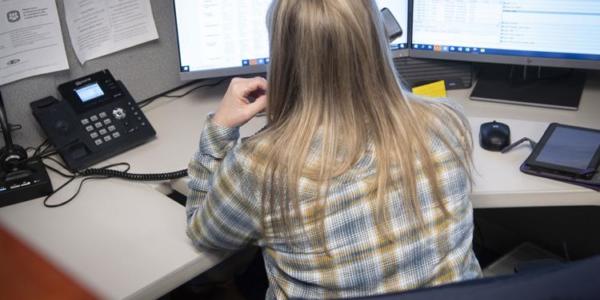Image: A Mental Health Association call-taker speaks with a caller Wednesday afternoon. The center operates 24/7 and deals with a wide range of calls. Photo by Bill Green, Frederick News-Post.
Article originally published by Frederick News-Post, February 10, 2021. For full article, please visit the Frederick News Post website.
Suzi Borg has worked at the Mental Health Association of Frederick County for more than 20 years, but she's never been as busy as she was in January.
Still, you won't see Borg complaining. With the coronavirus pandemic heightening the need for health and human services, Borg and her colleagues at MHA have met the moment — overwhelming as it has been.
A 211 Maryland partner, MHA call center staff are available around-the-clock for anyone experiencing a crisis or in need of someone to talk to.
“We don’t always know what might be available to us when we’re experiencing a time of struggle or crisis,” said Borg, crisis services division director at MHA. “And with so much going on in the world, having someone to just kind of help process can be really important and that’s one of the roles that the call center provides.”
So, 211 Day — Feb. 11 — recognizes the call center workers who field those calls and help connect people to the services they need. The free service is open to people of all ages and offers referrals and information about a variety of health and human services. The services are confidential.
The MHA Call Center also answers five additional phone lines, including the National Suicide Prevention Lifeline.
“We handle a good number of calls regarding suicide every year …” Borg said. “Anyone who contacts us, we will do our best to get them connected to the service that they would need. Sometimes people don’t know what is available or even that there would be an answer for, you know, a resource or something that could help them.”
Regardless of the way someone reaches the call center, Borg said, they're always ready to provide whatever counsel is possible, including topical responses to things such as COVID-19 questions.
Being so busy during a time when the situation is constantly evolving can be trying, Borg said, but she remembers there's a mission behind what they do.
“The people who do this work are real people,” she said. “It can be really tough, and it would be very difficult for me to say what motivates everyone, but they are a very special group of people who care about their community and … just care about people in general getting to the services they need.”
Rebecca Layman, development and marketing director at MHA, said the call specialists are an invaluable resource to the community.
“I believe [they’re] the unsung heroes of the pandemic,” she wrote in an email. “While they don’t have physical contact with the community, they are the lifeline to so many in need of support.”
And something they hear often, Borg said, is: “Oh, I’m talking to a person.”
“Because it’s not an automated message, and it’s real contact with people,” she said. “And that’s so much of what we’ve — I think as a community — we have missed during the past year, and so it seems like that connection is even more important.”
Andrea Walker, the director of Behavioral Health Services at the Frederick County Health Department, said in a statement that the 211 call center fills a crucial role in the continuum of care for Frederick County residents.
“A fully functional system of behavioral health care requires 24/7 access to crisis services,” she said. “Crisis and referral services are not a small part of the system, they are the center of the behavioral health system.”
Walker pointed out that research shows immediate access to supportive phone intervention can save lives and reduce emergency department use and unnecessary law enforcement interaction.
“The value of the supportive and timely intervention and referral services provided by 211 for those in need cannot be overstated,” she said. “Our behavioral health system would not function as well as it does without it.”

